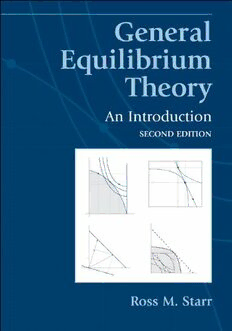Download General Equilibrium Theory: An Introduction PDF Free - Full Version
Download General Equilibrium Theory: An Introduction by Ross M. Starr in PDF format completely FREE. No registration required, no payment needed. Get instant access to this valuable resource on PDFdrive.to!
About General Equilibrium Theory: An Introduction
General Equilibrium Theory: An Introduction presents the mathematical economic theory of price determination and resource allocation from elementary to advanced levels, suitable for advanced undergraduates and graduate students of economics. This Arrow-Debreu model (known for two of its most prominent founders, both Nobel Laureates) is the basis of modern price theory and of a wide range of applications. The text starts with elementary models: Robinson Crusoe, the Edgeworth Box, and a 2-commodity 2-household 2-firm model. It gives a brief introduction to the mathematics used in the field (continuity, convexity, separation theorems, Brouwer fixed-point theorem, point-to-set mappings, and Shapley-Folkman theorem). It then presents the mathematical general equilibrium model in progressively more general settings, including point-valued, set-valued, and nonconvex set-valued demand and supply. Existence of general equilibrium, fundamental theorems of welfare economics, core convergence, and futures markets with time and uncertainty are treated fully. The new edition updates discussion throughout and expands the number and variety of exercises. It offers a revised and extended treatment of core convergence, including the case of non-convex preferences, and introduces the investigation of approximate equilibrium with U-shaped curves and non-convex preferences.
Detailed Information
| Author: | Ross M. Starr |
|---|---|
| Publication Year: | 2011 |
| ISBN: | 9780521533867 |
| Pages: | 379 |
| Language: | English |
| File Size: | 1.549 |
| Format: | |
| Price: | FREE |
Safe & Secure Download - No registration required
Why Choose PDFdrive for Your Free General Equilibrium Theory: An Introduction Download?
- 100% Free: No hidden fees or subscriptions required for one book every day.
- No Registration: Immediate access is available without creating accounts for one book every day.
- Safe and Secure: Clean downloads without malware or viruses
- Multiple Formats: PDF, MOBI, Mpub,... optimized for all devices
- Educational Resource: Supporting knowledge sharing and learning
Frequently Asked Questions
Is it really free to download General Equilibrium Theory: An Introduction PDF?
Yes, on https://PDFdrive.to you can download General Equilibrium Theory: An Introduction by Ross M. Starr completely free. We don't require any payment, subscription, or registration to access this PDF file. For 3 books every day.
How can I read General Equilibrium Theory: An Introduction on my mobile device?
After downloading General Equilibrium Theory: An Introduction PDF, you can open it with any PDF reader app on your phone or tablet. We recommend using Adobe Acrobat Reader, Apple Books, or Google Play Books for the best reading experience.
Is this the full version of General Equilibrium Theory: An Introduction?
Yes, this is the complete PDF version of General Equilibrium Theory: An Introduction by Ross M. Starr. You will be able to read the entire content as in the printed version without missing any pages.
Is it legal to download General Equilibrium Theory: An Introduction PDF for free?
https://PDFdrive.to provides links to free educational resources available online. We do not store any files on our servers. Please be aware of copyright laws in your country before downloading.
The materials shared are intended for research, educational, and personal use in accordance with fair use principles.

